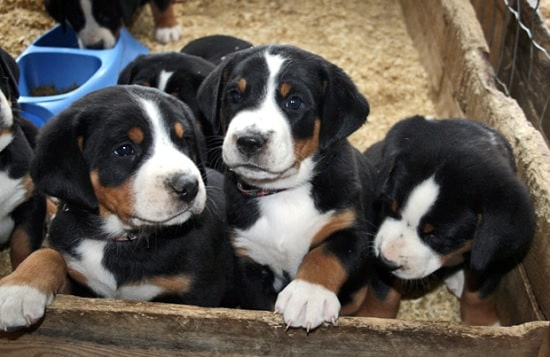Appenzeller Sennenhund Puppies
Appenzeller Sennehund is a medium-sized dog breed that was bred to herd livestock in the Appenzell region of Switzerland. They are a loving and affectionate dog breed that is hardworking and very smart. Their temperament is suited for a loving, energetic family that is involved in farming.
The female Appenzeller Sennehund can have 4-6 puppies at a time.
Newborn
When a puppy is born, it is born completely blind, deaf, and toothless. So, the Appenzeller Sennehund puppies cannot hear or see their mother when they are born and completely rely on her for food. They cannot eat any solid food due to no teeth, so they only have their mother’s milk which contains colostrum that is rich in antibodies. It protects the puppies from any kind of serious health problems when they are still a puppy.
Neonatal Stage (0-2 Weeks)
The first two weeks for the Appenzeller Sennehund puppies are a fragile but important phase. Since their eyes are sealed and they are not able to hear their mother, they use their sense of smell that is marked on the mother’s breast to get to her. They also cannot walk but will crawl to the place of their mother and pile up against her for warmth.

Image Source: Shutterstock
The Appenzeller Sennehund puppies are frail that they cannot even pee or defecate on their own. The mother helps them for that by licking the puppies to make them pee and defecate. They need about 90% of sleep when they are born for two weeks so that it benefits their development. By the end of the second week, the puppies grow double the size of their first weight.
Transitional Stage (2-4 Weeks)
One of the interesting and important stages is the transitional period when the puppies get familiar with the canine and human world. When they are 10-12 days old, the Appenzeller Sennehund puppies open their eyes for the first time and see their mother for the first time. at the end of the second week, they start to hear and get familiar with their mother’s voice.
They slowly start to move with their wabbly walk and start playing with their littermates. The puppies start to form their own vocabulary to communicate with their littermates and mother. They give a sweet yelping, whining, and small bark while playing and communicating.

Image Source: 101DogBreeds.com
Socialization Stage (4-16 Weeks)
The time when your puppies are ready for the outside world is known as the socialization stage. They need to be exposed to the outside world where they get to know different people and other canine friends. However, socialization should be done carefully as it is a delicate period where your puppy will accept anyone as their family members.
It is also the time for the vaccination against distemper, adenovirus, DHPP, and rabies. Training should be started as it is the right period for their basic obedience training. They are very eager to please at this age, so reward-based is the best method for training the puppies.

Image Source: 101DogBreeds.com
Juvenile Stage (3-6 months)
The stage in the middle of puppyhood and adulthood is the juvenile stage. They are still in the process of growing and need good training to make them a well-behaved adult. By 5 to 6 months, the puppies begin to experience their first heart but mating and breeding when they are still young can put their health on risk. So, Only start breeding when they are full-grown which is around 16 to 18 months.
Adolescent Stage (6-12 months)
This is the period where the puppies reach their adulthood. Although they are still in the development stage and growing, they have puppy behavior inside them for some more months. This is the time for advanced training so enroll them in agility and tricks as it helps for their mental stimulation.

Image Source: Dog Breeds List
Appenzeller Sennehund might need supplements, so provide them with the right supplements that they required. Give them a complete balanced diet and a required exercise to keep them fit and healthy.
Visit Doglime for more puppies behavior during different weeks.
Tags










